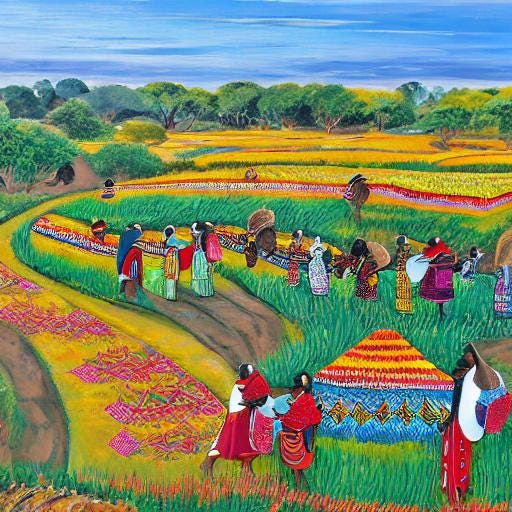The Black Man's Guide To Reality, Part Two
Rewriting African Spirituality into Our Daily Lives
:: Source Documentary Referenced at End of Article ::

In the first part of “The Black Man's Guide to Reality,” we explored various topics and themes, including nature and spirituality in African culture, as well as the concept of God speaking to us. It is important to note that these ideas of God and spirituality took place before the Bible and Christianity entered the continent.
We delved into the question of how early Africans connected with God and received divine messages before the advent of religions. Additionally, we examined the Bible itself, including different translations from Arabic to Greek and the fact that it disappeared for 600 years. These topics are crucial when considering the power dynamics and objective perspectives around the dominant religion that affects Africans today.
We also analyzed the influence of Rome on the Bible, acknowledging that Rome was a powerhouse that utilized whatever it could to maintain its influence. Finally, we addressed the confusion surrounding Christianity from an African perspective and explored the nature of evil, a major theme. In conclusion, we emphasized the importance of spirituality in Africa and its significance in humanity.
In today’s article, we dive deeper into how spirituality can be intertwined into our daily lives. We’ll continue our examination of nature and spirituality, as well as African life - and the potential future.
The Spirit is how God Speaks to Us
I believe that is where we need to start. African spirituality must be founded and grounded because spirit is the way that humanity achieves its objectives of the designer. When the designer created man, man was created for a purpose to achieve. A certain purpose that can only be known by the designer and the designer can only speak to men through the spirit.
We continue our conversation with our speaker Rutendo where he emphasizes the importance of spirituality as the starting point. Rutendo’s analogy of a designer highlights the idea that the a designer can speak to their creation, and that the creation can understand the voice of the designer. The creator speaks to us, guiding us towards our intended purpose.
However, in order to truly hear the voice of the designer, we must first understand our purpose. This is where spirituality comes into play. Rutendo asserts that, as Africans, it is crucial that we understand our purpose and that spirituality is the means by which we can achieve this. By knowing our purpose, we can align ourselves with spirit and move towards our intended destination. This passage is both powerful and thought-provoking, as it encourages a deeper understanding of the role that spirituality plays in our lives.
The Holy Spirit and Gnosis
That is why I do understand this conversation of the holy spirit, the bible. But in my spirit, and I'm a holy spirit-filled Christian, who has got all these questions that are now conflicting with what it is that I heard in the christian doctrine. And the question is, what spirit inside me is beginning to question these doctrines?
It's okay to question! Gnosis, or as early Gnostics described as Truth, is within all of us and it’s that small still voice that questions when things just don’t sit right. In a previous article discussing the religious implications of scientism, I delve into the topic of Gnosticism.
As stated in my article on Kyrie, I admire Gnosticism and I wrote the following passage on it:
Two religious ideologies that I strongly recommend would be, first, Gnosticism. Be warned, Gnosticism tells an entirely different view of creation than the whole "God created the Earth" story.
The second would be IFA, one of the oldest spiritual practices known to man, which has been said to have elements within the Bible and Hebrew language and predates Greek and Roman times by millennia.
For a high level, Gnosticism is based heavily on Christian teachings, but it offers a unique perspective on the religion, one which prioritizes truth above all else. According to Gnosticism, individuals do not need to be saved; rather, they simply need to seek and embrace the truth. As the Bible, which, the truth shall set one free, and Jesus, and other’s where here to show us how to seek the truth and how to live that truth, even if it requires persecution.
Keep reading with a 7-day free trial
Subscribe to Unorthodoxy to keep reading this post and get 7 days of free access to the full post archives.




